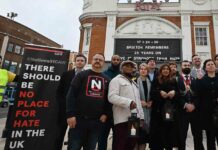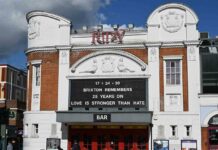After a week dominated by the riots, Emma Reynolds – who witnessed the looting in Brixton and was interviewed on the BBC last Monday – describes her experiences and looks back over the week’s events
As I was pushed up against KFC facing a man in a motorbike helmet striding at me with a metal pole, I wondered if I’d still feel quite so safe in Brixton any more. But mostly, as he demanded my phone, I was just praying that he wouldn’t hurt me.
After pleading, shamefully and falsely, that the photo was ‘for a friend’, I scurried desperately towards a male passer-by, who rushed away from me. Perhaps he reasonably didn’t want to get involved with the idiots taking pictures, but it was alarming how quickly survival instinct had taken hold of us all.
I should mention that both men appeared to be white – although it was hard to tell with the rioter in the helmet. Race didn’t matter – neither was feeling neighbourly right then. The police around the corner were keeping their distance, too.
Luckily, I escaped the predicament I’d landed myself in and ended up with a colleague, Ailsa Leslie, watching as a burning Foot Locker was tackled by fire-fighters beyond a line of riot police that stretched across the high street.
The earlier crowd of screaming, running youths had been replaced by voyeurs with cameras, intermingled with excitable teenagers shouting that they were off to the jeweller’s. The supposedly organised looters still seemed a little haphazard, aimlessly banging makeshift weapons against railings and smashing shop windows, charging up and down, whooping and phoning friends to join them.
Social networking tactics now blamed by politicians hardly seemed the point at that stage – the rioters seemed to feel like marauding warriors, laying waste to the neighbourhood and revelling in their moment of glory.
Yes, consumerism and greed ran through all this – as they run through our society – but it seemed enough to merely be part of something big, to break things and slash and burn a street of shops into boarded-up junkyards.
Who hasn’t wanted to trash something when frustrated? It was a chance to mount a raid with few apparent repercussions.
Of course, you’ll have to ask a rioter about that, something that that few have done. Those who have spoken have vaguely claimed to be fighting for what they deserve from big, rich companies, or showing what they think of the ‘authorities’.
Many commentators have quashed this by saying the thieves were opportunistic, thuggish, even evil. Their haphazard logic does not seem to stand up, and they were attacking their own neighbourhoods.
But that is an extreme step – certainly one that has not been seen, even in the Brixton of bad repute, for decades. Someone has to be seriously troubled if they are not just hurting others, but destroying what is theirs.
Just as confused as some of the mob, we eventually realised they were running up Effra Road – where I live – and we tried to follow from a safe distance this time, filming on our phones as subtly as we could. Passing wheelie bins blazing in the road, Ailsa and I saw that the big target was now Currys, the electrical store in the retail park.
We stood sheltering from the driving rain under a tree on a hillock by the road, as masses of people clattered into the grill behind the now splintered glass. It was like watching a war, and while the police waited in their lines not two minutes away, the metal crumpled upwards and girls and boys swarmed through the car park carrying huge TVs and using boxed computers like umbrellas.
A few boys in hoods started noticing our cameras and got aggressive, chucking heavy chunks of granite at our backs as we walked carefully away. Only groups of rioters were left in the hushed streets, intimidating in hoods and balaclavas.
Later, we saw a high-spirited jumble of teenagers carrying items like vacuum cleaners alongside people with knives and other, more unpleasant, elements – a man ready to hit a 10-year-old to abduct his looted television. A helicopter hovered just above and the police finally moved in as screeching tyres, sirens and shouting kids rang out until 3am.
It was little in comparison to the shocking reports of burning Tottenham and Enfield. A night later, Peckham, Croydon and Clapham faced department store raids, burning vehicles and shops razed to the ground. Richer parts of London, such as Camden, suffered as much as Brixton. Then, the rest of the country.
Of course the events were concentrated around poorer areas, but earlier that day, while Brixton Splash festival was taking place, people had issued dire predictions for our historically violent area. Was it a self-fulfilling prophecy?
I’ll continue to tell people that Brixton is safe, diverse and vibrant – but I will also face head on the fact that some people living in the area feel disconnected from it and many of those who have grown up here, unlike Johnny-come-latelies like myself.
The riot clean-up drives have been inspiring and reassuring in such a bleak period, but warm and fuzzy gestures are not enough. If we care about Brixton, then we should do more than tweeting about the horror of it all before heading for an organic pizza in the market.
As Brixton becomes increasingly gentrified, it isn’t right that the class divide should increase until people want to rip up phone boxes and set Nando’s alight.
We can’t change everything the government does, but we can keep volunteering, donating, getting involved in local activities, campaigning about the broader social issues and waking up to the fact that everyone who lives here has a right to share in this community.







Hi Emma,
Brilliant post and videos – sounds like you and your colleague were pretty brave on Sunday night.
I completely agree that the clean-up efforts were well-intentioned (and an important statement) but nowhere near enough, and not even a first step towards understanding what happened.
There’s a meeting this Wednesday at 6pm in Lambeth town hall to talk about what else can be done. But if you come across any other local activities or ways to campaign or volunteer, it’d be good to hear about them.
Kaye